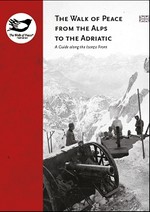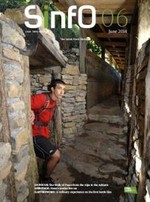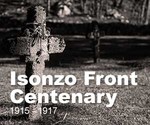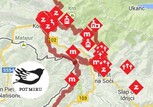The First World War in Writing
The First World War will, among others, remain inscribed in historiography because, for the first time in history, it was verbalized in one way or another by everyone whom it had affected. This was, indeed, the very first watershed event in the history of mankind that enabled the so-called “view from below”. For the first time in history, some event, process or phenomenon has left behind such a voluminous legacy of testimonies of ordinary people that enables us to truly see it from the point of view of mere mortals.
It was also the first time that women’s voices emerged on a large scale – not only due to the onset of the suffragette movement, but primarily owing to deeper and sometimes merely temporary massive changes that the war had brought upon civilian life. Suddenly, women took on roles which no one could have imagined before, least of all women themselves. And unexpectedly, their word (in letters, memoirs, literature, etc.) became an integral, if not indispensable, part of everyday intimate and public communication.
In short, the First World War was a teacher to anyone – at least in Europe – who showed the slightest bit of interest in expressing themselves in words: any man on the front who jotted at least two words on the official “I am well and doing fine” war postcard and anyone who could write back, saying that they were missed. Except on the margins of Europe, literacy was so widespread that one hundred years later, we can trace a whole spectrum of more or less subtle skeins of sympathies, desires, fears and hopes from various parts of the continent. A vast majority of those involved were able to use those few basic expressions to convey their apprehension, longing, feigned courage as well as sparing descriptions of the situation on the front and in the rear of the army. Everyone, each in their own way and in line with their education, habits and social norms, could grow accustomed to the acquired codes of the then letter correspondence. Moreover, since each and every one of them, regardless of their origin, seized this sole opportunity to establish contact with their loved ones, it is now possible to discern innumerable nuances of plight, fears and hopes even behind the most laconic and inexpressive words:
“We are expecting to go up again in two […] days, so dearest pray hard for me and ask Marie for God will not refuse her prayers […] Dearest […] I love you more than ever. I long to take you in my arms again […]. I often take your photo out of my pocket and look at your dear face and think of the times we have had together, some lovely days eh love, and when I think again of some of the worry I have caused you it makes me only the more eager to get home to you to atone for all the worry and anxious moments you have had to put up with […] Goodnight love God bless you and my children and may he soon send me back to those I love […] Your Faithful Husband […].”
(Brown, 1993:71)
The power of writing was also quickly recognized by all state propaganda machines. In Great Britain, for example, military offices called on the relatives to write to their men on the front regularly in order to lift their spirits:
“Send him a cheerful letter,
Say that it’s all OK.
Tell him you’ve ne’er felt better,
Though it’s all the other way.
“Don't send a word of sorrow,
Send him a page of joy,
And don't let your teardrops
Fall upon the kisses
When you write to your soldier boy.”
(Macdonald, 1988:137)
While we may never know the extent to which British girls and wives adhered to the instruction above, the loving, anxious and sad letters to the front tell us (almost everything) about the life at home. From diseases of children, the latest pub gossip, tense intergenerational relations, etc. to detailed descriptions of the year’s harvest and weather.
The parts that are missing were usually deleted/removed/obliterated by censorship. Or, to be more precise, censorship most often eliminated the unpleasant, confidential or otherwise “problematic” information which was thus brought to light only after the publication of well-hidden diaries and other postwar literature. Belles lettres, in particular, fit some crucial pieces into the portrayal of the everyday plight, which had been kept concealed during the war. What would the relatives have thought if their brother, father or son had replied as to where their army was: “in dung […] Up to our ankles […] nothing but mud everywhere, a slimy road, a small station, wagons, people […] on the well-trodden streets covered with mud slooshing up to our shoulders, chest, over our faces …” (Hofbauer 1935:32)
What would they have thought of this army, if their hero had confessed that, on their triumphant march, they had also killed civilians; the elderly, women and children … And finally, what would they have thought if, rather than having instructed them on how to write high-spirited letters, the propagandists had sent them the verses of those who were the quickest to realize that much of the war propaganda was one big lie. What if they had been sent the lines of Wilfred Owen:
“If you could hear, at every jolt, the blood
Come gargling from the froth-corrupted lungs,
[…] you would not tell with such high zest
To children ardent for some desperate glory,
The old Lie; Dulce et Decorum est
Pro patria mori.”
(Silkin, 1996: 193)
Or if they had been offered excerpts from the war bestseller Le feu (Under Fire) written by a French soldier-author who described the war primarily as “a nightmare of earth and mud” and wrote about “a vision of horror of which one can know only after one has been under shrapnel and shellfire.” (Luthar 2000:62)
Had this been so, the contemporaries of the war could have already seen the war as clearly as we do today, thanks to these men. For this reason the history of the First World War happened to be an important episode in the history of writing.
Dr Oto Luthar, Director of ZRC SAZU
LITERATURE
Brown, Malcolm; 1993, The Imperial War Museum of the First World War. A Great Conflict Recalled in Previously Unpublished Letters, Diaries, Documents and Memories, Singwick & Jackson, London.
Hofbauer, J.; 1935, Pohod v zmedo, Evalit, Ljubljana.
Luthar, Oto; 2000, O žalosti niti besede. Uvod v kulturno zgodovino Velike vojne, Založba ZRC, Ljubljana.
Macdonald, Lyn; 1988 1914-1918. Voices and Images of the Great War, Penguin Books, London.
Silkin, Jon; 1996,The Penguin Book of First World War Poetry, Penguin Books, London.










